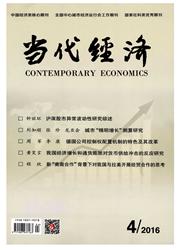

 中文摘要:
中文摘要:
通过系统地整合MFA方法、DEA方法和生态效率评价法,探讨了一种绿色增长视角下的全要素能源效率评价方法,并对中国1953~2012年的全要素能源效率、能源的经济效率、能源的环境效率和能源的生态效率进行了实证研究。定义了全要素能源效率评价的指标体系,投入指标是能源、人力资源、资本资源、科技资源以及能源的隐藏流,产出指标是经济价值与环境正影响。该研究给出的全要素能源效率评价方法不仅讨论了我国能源利用过程中全要素能源效率的评价问题,还将经济价值、环境影响和生态代价纳入全要素能源效率的评价框架中,是一种符合绿色增长理念的能源效率评价方法。
 英文摘要:
英文摘要:
The article, systematically integrating the method of MFA, DEA, and the evaluation method of eco-efficieney, discussed a method of evaluating total factor energy efficiency which is based on the perspective of green growth ; Then, the article conducted an empirical research of total factor energy efficiency, economic efficiency of energy, environmental efficiency of energy, and eco-efficiency of energy of China from 1953 to 2012.It defined the concept of total factor energy efficiency and the indicator system of evaluating total factor energy efficiency. Among them, the input indicators are energy, human resource, capital resource, science and technology resource and hidden flow of energy, while the output indicators are the economic value and environmental positive impact. The results confirmed that the method of evaluating total factor energy efficiency not only discussed the evaluating problem of total factor energy efficiency of the process of energy using, but also brought economic value, environmental influence and ecological cost into evaluating framework of total factor energy efficiency. So it is a more scientific and comprehensive method of evaluating energy efficiency.
 同期刊论文项目
同期刊论文项目
 同项目期刊论文
同项目期刊论文
 期刊信息
期刊信息
